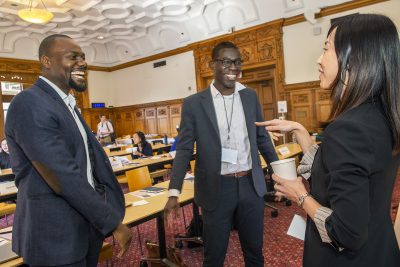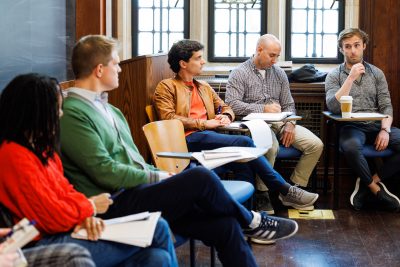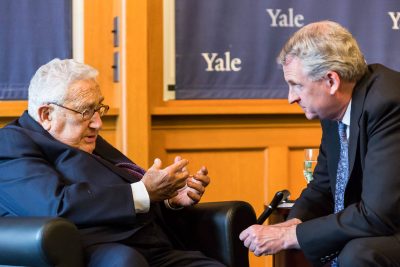ISS supports outstanding programs, in which scholars, practitioners, and students collaborate on pioneering research of the highest quality.
Africa Security Program
The Africa Security Program (ASP) is a forum for scholarly engagement and multidisciplinary research on the strategic role of Africa in global affairs and the sources, dynamics, and consequences of security challenges in Africa.
The ASP’s areas of research emphasis include:
Through workshops, seminars, and conferences, the ASP brings together faculty, students, and practitioners to build a critical body of knowledge about African security issues and to offer novel mechanisms to address them. The ASP is directed by Benedito Machava, Assistant Professor of History, with the active participation of ISS-affiliated faculty and practitioners, including Ambassador Harry Thomas and Ambassador Bisa Williams.
The ASP’s areas of research emphasis include: the role of Africa in global affairs, violent Islamist extremism in Africa, and climate change.
America, China, and Eurasia Program
China’s ascendance to great power status is the defining feature of the twenty-first century, while Putin’s Russia remains deeply disruptive to the U.S.-led liberal world order. As the United States turns inward to contain and mitigate the impact of the Covid-19 pandemic, China and Russia are seeking to fill that leadership void in Asia, Europe, and on the world stage.
The 2018 U.S. National Defense Strategy for the first time identified the “re-emergence of long-term, strategic competition,” and “not terrorism,” as the primary American national security concern—a position that the Biden Administration has maintained. Deciphering Russian goals vis-à-vis Eurasia, as well as Chinese intentions with regards to the Indo-Pacific region, can help prevent intense geopolitical competition from inadvertently escalating into conflict. This new ISS project combines the study of history with current policy analysis.
ISS affiliated practitioners include Amb. Susan Thornton, Senior Fellow at the Paul Tsai China Center, Yale Law School. A retired senior diplomat with nearly three decades of experience, Amb. Thornton is the former acting U.S. Assistant Secretary of State for East Asian and Pacific Affairs, where she was responsible for stabilizing relations with Taiwan and the U.S.-China Cyber Agreement, among other critical assignments.
Stephen Roach, former Chairman of Morgan Stanley Asia and a Senior Fellow at the YLS Paul Tsai China Center, and Amb. David Rank, a Jackson Senior Fellow and former acting U.S. Ambassador to China, also participate in this program.
Brady-Johnson Program in Grand Strategy
The Brady-Johnson Program in Grand Strategy offers a year-long course (“Studies in Grand Strategy”) to Yale undergraduates and graduate students that addresses large-scale, long-term strategic challenges of statecraft, politics, and social change. The course encourages understanding of historical and contemporary global and domestic challenges, while developing students’ capacity for strategic thinking and effective leadership in a variety of fields.
The program integrates academic study at the undergraduate, masters, pre-doctoral, and post-doctoral level and is open to current Yale students.
The program supports other activities including: pre- and post-doctoral fellowships in grand strategy; student and faculty research, academic conferences, and other scholarly work in grand strategy.
Johnson Center for the Study of American Diplomacy
The Johnson Center for the Study of American Diplomacy was established in 2011, shortly after Dr. Henry A. Kissinger donated his papers to Yale University. The Kissinger Archives at Yale University consist of approximately one million documents and objects covering Dr. Kissinger’s extraordinary life as a diplomat, scholar, teacher, and private citizen.
The Kissinger papers at Yale serve as a foundation for the Johnson Center. As a program of Yale’s Jackson School of Global Affairs, in collaboration with International Security Studies and the Brady-Johnson Program in Grand Strategy, the Johnson Center encourages research and teaching on United States foreign policy by drawing on the Kissinger papers as well as other important Yale library collections in this field.
Kissinger Visiting Scholars who are researching and writing about the history of American diplomacy.
The center hosts an annual conference and other events that convene practitioners and scholars from around the world to discuss contemporary issues in international affairs.
Maritime and Naval Studies Program
Maritime trade underpins the world economy, rising sea levels threaten coastal communities, and American naval hegemony is no longer assured. The ISS Maritime and Naval Studies Project convenes leading academics and practitioners to analyze lessons from naval history and the precarious state of maritime affairs today.
Under the leadership of Professor Paul Kennedy, ISS has hosted a series of speakers and events aimed at promoting the study of the sea at Yale, including a major international conference in 2018 on “Navies in Multipolar Worlds” and a Naval History Conference in spring 2022.
In addition, ISS has a close partnership with Admiral James Stavridis, former Supreme Allied Commander of NATO and Dean of the Fletcher School at Tufts University.
Nuclear Security Program
Nuclear weapons are once again at the top of the scholarly and policy agenda after being on the sidelines of discourse for decades. Russia’s 2022 invasion of Ukraine and Putin’s brinkmanship have reignited concerns over nuclear war. Prospects for arms control agreements between the United States, Russia, and China appear dim, with the termination of the Intermediate-Range Nuclear Forces (INF) Treaty and China’s nuclear buildup. Efforts to curb Iran’s nuclear program face important challenges, and North Korea continues to develop its nuclear arsenal.
To better understand and address these increasingly complex and challenging realities, ISS launched the Nuclear Security Program (NSP), led by Associate Professor of Political Science Alexandre Debs.
Schmidt Program on Artificial Intelligence, Emerging Technologies, and National Power
The Schmidt Program fosters research and teaching that span the disciplines of computer science, data science, economics, engineering, history, international relations, law, philosophy, physics, and political science. It serves as a hub for scholars and practitioners working across disciplines on the technological and strategic transformations that are reshaping our world.
Cyberspace is now the backbone of global commerce, communication, and defense systems, and a key aspect of the critical infrastructure that powers modern civilization. Technologies and information spread nearly instantaneously, while the world economy and supply chains are integrated to a degree unprecedented in history.
Yet despite the immense benefits that have resulted from global connectivity, significant vulnerabilities persist, and threats are on the rise. Competition over strategic technologies and contests for advantage in the “information space” are growing, so far without standard international rules of the road. Moreover, the future likely will prove even more transformative due to advances in artificial intelligence (AI). Machines capable of sophisticated information processing, towards the frontier of autonomy, pose tremendous opportunities for economic growth and societal well-being. But the potential threats also are extraordinary: autonomous weaponry, AI-augmented cyberwarfare, sophisticated disinformation campaigns, and geopolitical instability as nations race to deploy these unpredictable technologies. The Schmidt Program examines how AI has the potential to alter the fundamental building blocks of world order.







